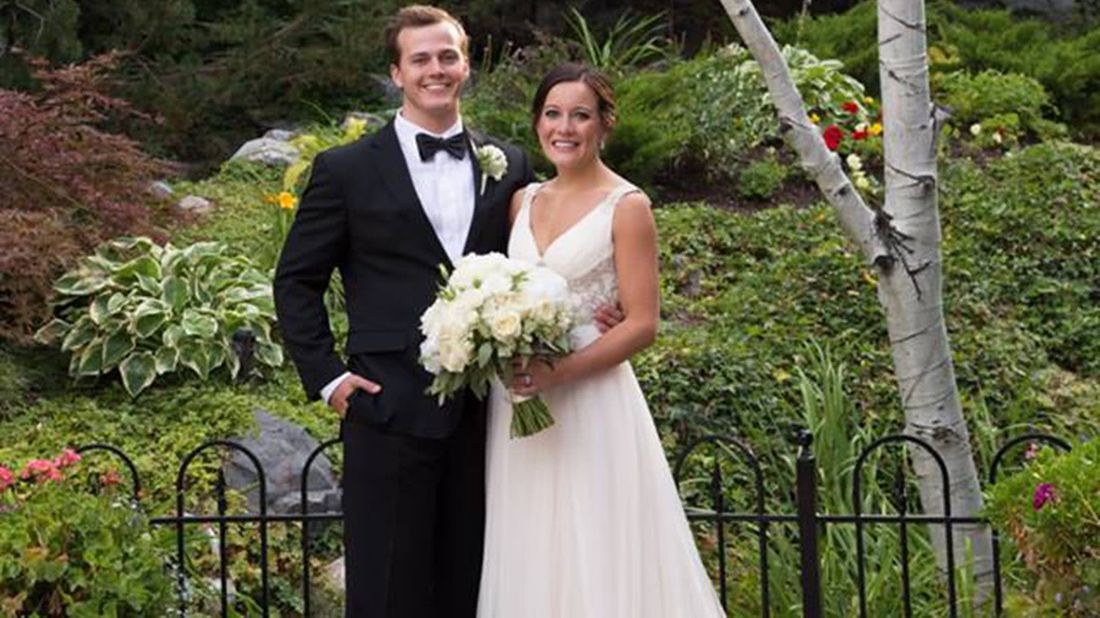What I Wish I’d Known About Merging Finances Before I Got Married

When I got engaged I immediately started dreaming about picking out my wedding dress, tasting cake samples and all the other fun perks that come with saying “I do.” What I didn’t dream about? Those tough, uncomfortable, but crucial conversations about how we were actually going to handle our money as a married couple.
Before getting married, my husband, Emerson, and I had some basic financial discussions about debt, our spending and saving habits and how our parents handled money. So, I felt pretty confident that merging finances would be a non-issue. But now, a year and a half into marriage, I realize there were so many other questions and conversations we should have had. Here were our biggest pain points, and how we worked through them.
A year and a half into marriage, I realize there were so many other questions and conversations we should have had.
-
ADJUSTING TO ONE BANK ACCOUNT
Before we tied the knot, I lived with roommates, worked a full-time job as a wedding planner and supported myself on my income. My husband, on the other hand, lived at home with his parents while studying chemical engineering at the University of Utah.
I knew that I’d continue to work full time while he finished school and understood that the bulk of my salary would pay our expenses. What I didn’t realize was how I’d really feel about paying all of our expenses, or how much more it cost to support two people instead of one.
I never thought that money would make me feel so territorial — but it did. It was crucial for him to understand that even though our bank accounts were joint on paper, I felt like I was the only one contributing to the pot.
How we handled it: After months of the frustration of overspending and needing to dip into savings to pay bills, my husband and I had an honest conversation about the logistics of our budget and the emotional aspect of merging finances. We realized we were spending too much on entertainment and dining out; and we were not accounting for unexpected expenses like oil changes for our cars, birthday gifts for family members, or medical co-pays. When it came time to pay bills we didn’t have enough in our checking and needed to pull money out of savings to cover those extra costs. Our savings declined while my frustration grew.
We finally set a strict budget, tracked all our spending and accounted for miscellaneous expenses each month. This was simple, yet effective. We cut back on eating out and decided to eat at home at least five nights a week. My husband took public transportation to save on gas money. I suspended my expensive CrossFit membership and opted for a less expensive gym. These compromises helped us save an extra $500 a month to keep our budget on track and help our savings finally increase.
Voicing my own feelings and hearing my husband’s helped me move past my emotional hang-ups and accept that all money earned — including my husband’s — now belonged to the both of us.
-
ALIGNING OUR SPENDING HABITS
The second financial struggle we encountered as newlyweds was figuring out how and where to spend our money. After we covered our basic financial needs (rent, groceries, gas, savings, etc.), we had different ideas about how we should spend our disposable income. My husband wanted an expensive cable package so he could watch sports, but I wanted to cut the cord. I wanted to travel and see the world, while my husband likes camping close to home. It was clear that we needed to figure out how to spend our money in a way that satisfied both of our wants.
How we handled it: We both have side hustles, so we decided that any of our side income could be spent on the hobbies of our choice. I like to use my discretionary money to go shopping or get pedicures with my girlfriends. He likes to purchase camping equipment with his extra money.
As long as our bills are paid and money is set aside in our savings account (we’re working toward a home down payment) and retirement funds each month, we allow ourselves to indulge in a small splurge and have some fun with our earnings. And since we don’t have children yet, this tactic works great for us.
-
ASKING PERMISSION TO SPEND MONEY
When I was single, I could go on a shopping spree, buy concert tickets or take a last-minute trip on a whim. But when you’re married, your spending doesn’t just affect you anymore — you have to consider your partner. Even though my husband and I are both thoughtful about how we spend our money, I wasn’t used to asking permission before buying something.
How we handled it: After a few months of questioning each other’s recent purchases, we decided to set a spending limit on our joint account (side gig money excluded). If we wanted to go out to lunch with coworkers, no need to ask permission. But if we wanted to drop significant money on new shoes or a season ski pass — ask the other person first. We set a spending limit of $75 and agreed to check in with the other person if we wanted to buy something over that amount.
I know we’ll continue to experience financial hurdles in our marriage as time goes on; but these open conversations have helped us immensely. Marriages thrive on honesty and communication, especially when it comes to finances and marriage.
Take the next step.
Your advisor will answer your questions and help you uncover opportunities and blind spots that might otherwise go overlooked.
Let’s talk




